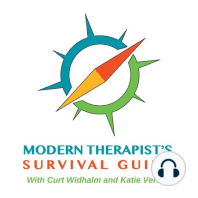32 min listen
Health At Every Size
FromThe Modern Therapist's Survival Guide with Curt Widhalm and Katie Vernoy
ratings:
Length:
36 minutes
Released:
May 13, 2019
Format:
Podcast episode
Description
An interview Laura Westmoreland, LMFT on addressing body bias, body shaming, and health at every size (HAES) in therapy. Curt and Katie talk with Laura about the common mistakes that therapists make when working with clients living in larger bodies. It’s time to reimagine therapy and what it means to be a therapist. We are human beings who can now present ourselves as whole people, with authenticity, purpose, and connection. Especially now, when therapists must develop a personal brand to market their practices. To support you as a whole person and a therapist, your hosts, Curt Widhalm and Katie Vernoy talk about how to approach the role of therapist in the modern age. Interview with Laura Westmoreland, LMFT Laura Westmoreland, LMFT identifies as a white woman living in a larger body, cisgender, straight, and able-bodied; her pronouns are she/her. She acknowledges that she has white privilege. She holds an MBA from Lindenwood University and a Masters in Clinical Counseling from Pacifica Graduate Institute. Her practice is grounded in Psychodynamic and Sensorimotor psychotherapies. She integrates supplemental theoretical interventions on a case-by-case basis; treatment is individualized and collaborative. Additionally, She is a Certified Intuitive Eating Counselor and a Certified Body Trust®Provider, and she follows Health At Every Size® Principles. She works with individuals, couples, and families who want to explore what is holding them back from leading the life they desire; both personally and professionally. The key to her work is the relationship developed. Together with her clients, she can create a brave space; a brave space requires stepping out of your comfort zone, risking vulnerability, and being curious. Laura believes... what we struggle with provides insight and can help us grow connection is key; reciprocal relationships require effort regularly engaging in pleasurable activities fosters joy and happiness in nourishing mind, body, and soul that self-compassion is vital to wellbeing all bodies are good bodies In this episode we talk about: The importance of inclusion related to body diversity What body bias looks like in a therapist office Health At Every Size (HAES) The challenges of living in a larger body The war on obesity and walking into a war zone The medicalization of body diversity with words like “overweight” and the pathologizing of different bodies The danger of colluding with the diet culture The controversy that exists within the eating disorder community related to HAES Focusing on the client’s lived experience, rather than the societal expectations Sorting through when larger bodies suggest symptomology of a mental health or trauma concern versus when someone is healthy in a larger body Showing curiosity around what “feeling fat” means, rather than suggesting a diet or fix The danger of prescribing to people living in larger bodies what we would treat in eating disorder clients (i.e., restriction) How a clinician’s body bias can negatively impact treatment efficacy Intuitive eating – paying attention to hunger and satiety cues Joyful movement, rather than trudging to the gym The importance of finding your healthy practices Assessment best practices Harvard Implicit Bias Tests The different biases that Curt and Katie hold around body sizes Bias and microaggressions that can show up in the therapist office What therapists can look for when assessing whether clients feel comfortable in their own bodies Relevant Resources: We’ve pulled together any resources mentioned in this episode and put together some handy-dandy links: Laura Westmoreland’s Website FB: Laura Westmoreland Lmft IG: haes_therapist_in_la Twitter: @haestherapistla Intuitive Eating Website Be Nourished Jeffery Hunger’s Publication Harvard Implicit Bias Tests (Association for Size Diversity and Health) ASDAH Dr, Vincent Felitti talks about the Adverse Childhood Experiences Study The Modern Therapists Group on F
Released:
May 13, 2019
Format:
Podcast episode
Titles in the series (100)
Managing Your Online Reputation: Curt and Katie talk about navigating through negative Yelp Reviews, Google Searches, and Therapist Facebook Groups by The Modern Therapist's Survival Guide with Curt Widhalm and Katie Vernoy
